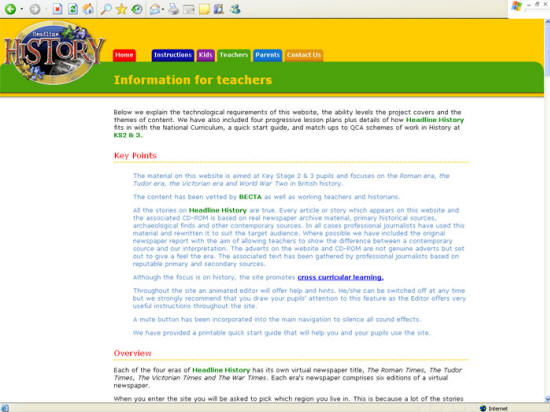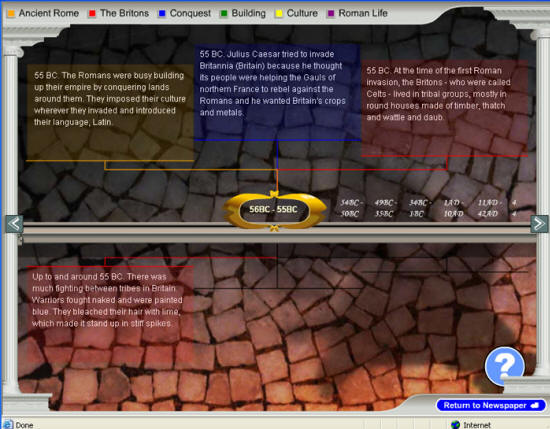 |
 |
||||||||||||||||||||||||||||||||||||||||||||||||||||||||||
|
|
|||||||||||||||||||||||||||||||||||||||||||||||||||||||||||
|
Headline History Headline History - an innovative and interactive site that helps children learn about English history and become online reporters - was an original idea by Derbyshire-based Northcliffe Electronic Publishing which was picked up and commissioned by the British Government's Culture Online division - part of the Department for Culture, Media and Sport.
Since launching its pilot phase in spring 2004, www.headlinehistory.co.uk has scooped a hatful of awards, latest of which is Outstanding Website in the 2005 WebAwards. The site is primarily aimed at teachers of eight to 14-year-old and is intended to be a classroom teaching tool. But Headline History's project manager Julie Bayley said: "We worked hard on the design, graphics and video and audio clips to give it the ‘wow’ factor and we hope youngsters will be inspired to keep using the site at home with their families too." The site covers the Roman, Tudor, Victorian and World War Two periods of English history. "England was the remit Culture Online had to cover, but we would love to expand the site into Wales, Scotland, Ireland or abroad if funding was to become available from other sources in the future," said Julie. The site features 24 online newspapers (six for each of the four periods of history covered). There is masses of child-friendly content to explore - including hidden video, audio and picture galleries. The newspapers are split into eight regional editions and there are four ability levels for children and their teachers to choose from - ranging from trainee newshound to veteran hack - which dictate the difficulty of the tasks the visitors face as online reporters.
Each front page story of each edition has up to five "eye-witnesses" - including Queen Elizabeth I, Emperor Nero, Winston Churchill and William Shakespeare - who answer pre-set questions in video clips. Their quotes then populate an on-screen notebook and can be used by the youngsters to add colour and detail to the main story of that edition, or in some cases to change the angle or perspective of the story. It also features information on places where children can go to learn more about the periods of history being studied. Each era also includes a slick timeline which puts events in perspective and adds more factual information. The use of Flash 7 software in the construction of Headline History raised many challenges for NEP's developers and designers. At the time of starting the project Flash 7 was relatively new. A lack of documentation made the configuration of Flash Com Server exceedingly difficult with dynamic elements difficult to implement, forcing NEP to take the site back to basic script in order to achieve the next phase. NEP's multi-media producer Nik Hewitt said: "We often found that Flash 7 did not behave as expected. We found ourselves unable to replicate simple elements, and development was delayed by inexplicable glitches where there was little or no correlation between objects and scripted elements despite coding being identical. No solutions could be offered for this outside the company despite these being identified as common problems. "All these challenges were solved by long-term experimentation, trial and error, the unparalleled dedication of our developers, the rewriting of previously written elements and constant improvement of code, and a comprehensive ‘bug tracking’ system which was put in place early on." Another key challenge facing the Headline History team at NEP was delivering each phase of the project on time to the high standard which the team set itself. To a degree this was made more difficult by the unexpected and extensive documentation requested externally, taking key team members away from the management and development of the project and at times jeopardising the delivery of certain phases of the project. The full site launched in spring 2005, and a few weeks later won a prestigious Interactive BAFTA in the children's learning category from the British Academy for Film and Television Arts. NEP believes that its decision to use actors and not animation played a major part in the BAFTA win. The decision brought with it, however, a series of new hurdles. Nik said: "Budgetary and geographic constraints meant that we were forced to abandon the idea of rehearsals and professional recording space. This problem was overcome by allowing extra time 'on the day' with performers, constructive editing, the use of tight sound recording to allow for unwanted atmospheric effects, good casting and the patience of the director, performers and crew involved. "Location shooting was also impossible due to the large nature of historical backgrounds and so chroma key and professional lighting were utilised to create the desired effect." NEP felt it was imperative to make the scripts for the actors as historically accurate and gripping as possible and went to great lengths to achieve this. For example, for the story of a pit disaster in Victorian Leicestershire, the team managed to unearth the verbatim inquest report about those who perished and weaved part of that into the associated scripts. Julie said: "We consulted a user group of teachers and historians at every stage of development to sanity-check our ideas and factually check our content. Every news story that appears in all of the online newspapers is true, and many of them have never been seen for decades. They've been hidden away in regional newspaper archives or on library microfiche which is difficult for children to access. We made a special effort to pepper our site with quirky stories children will love... like the butcher who blew his house up when he made a pot of tea with gunpowder by mistake. "The most common comment we get from teachers and parents is ‘We wish we'd have had this sort of resource when we were growing up.’” To make the content accessible to as many people as possible, the development team also created an html version which has all the stories and adverts from the newspaper and all the audio from the 120 historical eye witnesses. This html version was also put on to a CD-ROM and a free copy sent to every English school with pupils within the target age range. The project's last piece of development work planned is to launch a "hot seat" chat feature which will allow visitors to ask questions of historical characters. It is hoped this will encourage more youngsters to submit their own work to be uploaded to the site. Feedback has been positive with messages of support and congratulations from figures including British author, and children's' laureate, Jacqueline Wilson, and actor and historian Tony Robinson. At the last count more than 100 educational or historical websites across the world were linking to Headline History and giving it glowing reviews.
Northcliffe Electronic Publishing is the Internet division of the Northcliffe Newspaper Group - part of the Daily Mail and General Trust Group. Headline History has also won three awards from the Newspaper Society (Best Web Design; Best Online Promotion and Best Digital Media Development); The People's Award for Best Use of Broadband in the 2005 Webby's and been highly commended by the Association of Online Publishers; the International Visual Communication Association and New Media Age.
|
|

